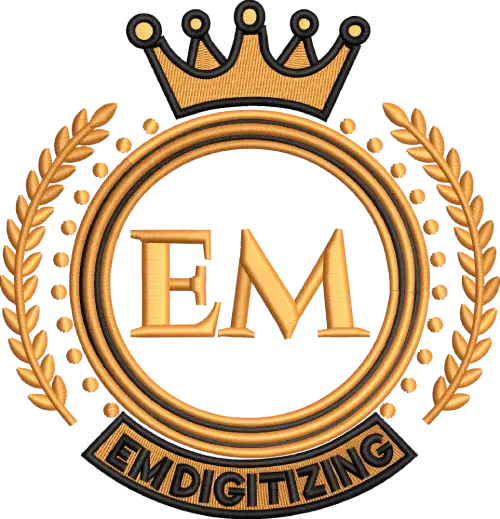Je ne sais pas si vous devez choisir la broderie vs l'impression pour vos vêtements personnalisés? Faisons les choses simples. La broderie ajoute une finition chic et durable, Parfait pour les logos sur les vestes ou les casquettes. Impression, d'autre part, est idéal pour le gras, Designs colorés et fonctionne très bien pour les t-shirts ou les commandes en vrac.
Chaque méthode a ses propres forces, Le bon choix dépend donc de votre projet. Dans cet article, Nous allons briser les différences, vous aider à voir lequel correspond le mieux à vos besoins. Prêt à découvrir? Plongeons dedans!
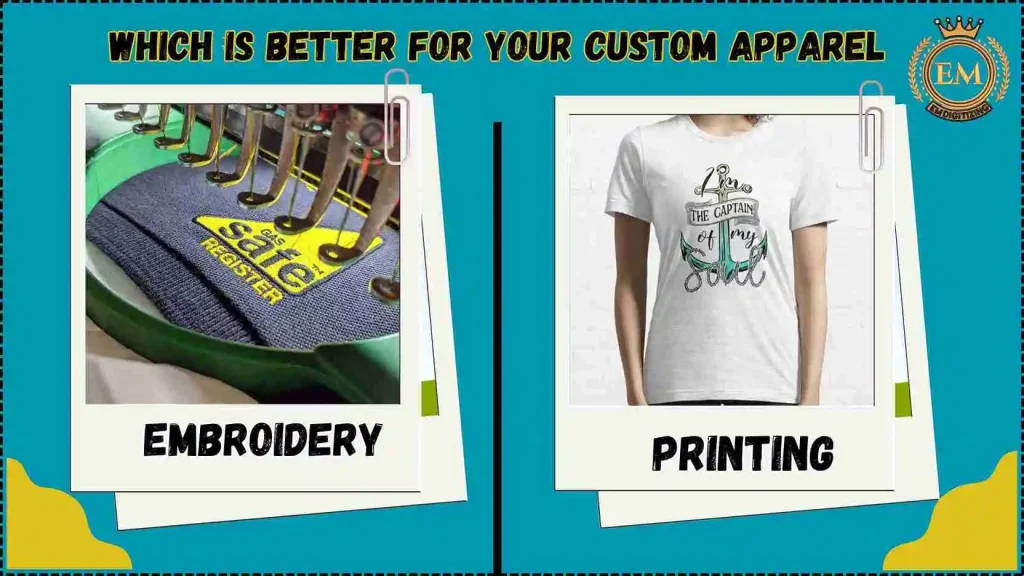
Broderie vs impression: Quel est le meilleur choix pour vos vêtements personnalisés?
Qu'est-ce que la broderie?
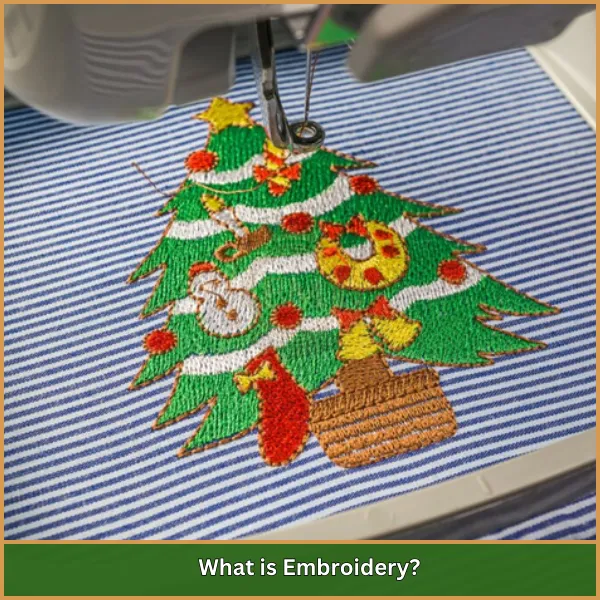
C'est l'art de tissu de décoration ou d'autres matériaux utilisant une aiguille pour appliquer du fil ou du fil. Ce processus peut créer des conceptions complexes, motifs, ou logos, Ajout d'un look texturé et premium aux vêtements.
Avantages:
- Durabilité: Les conceptions brodées sont de longue durée et résistantes à l'usure.
- Apparition professionnelle: Fournit une qualité de haute qualité, aspect poli, Idéal pour les vêtements d'entreprise.
- Polyvalence: Fonctionne bien sur une variété de tissus, y compris des matériaux épais et texturés comme les chapeaux et les vestes.
Limites:
- Coût: Généralement plus cher que l'impression, Surtout pour les grandes conceptions.
- Complexité de conception: De beaux détails et les gradients sont plus difficiles à réaliser.
- Production en vrac: Peut ne pas être rentable pour les commandes à volume élevé avec des conceptions complexes.
Qu'est-ce que l'impression?
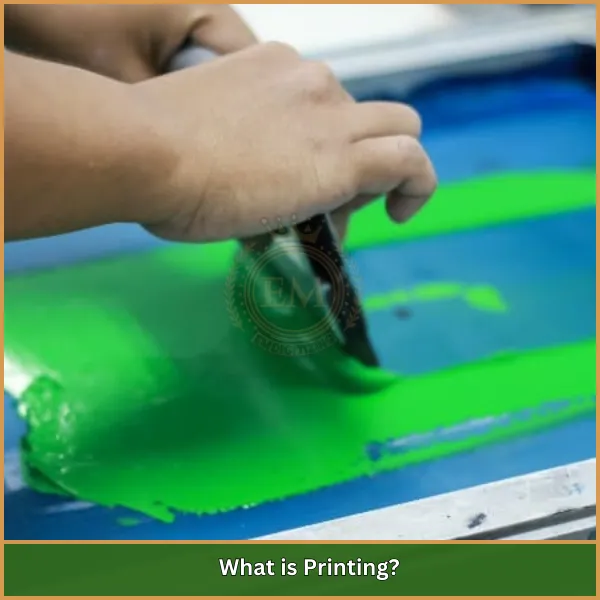
C'est le processus de transfert des conceptions, logos, ou motifs sur tissu en utilisant des techniques spécialisées. Il offre une flexibilité pour créer des conceptions dynamiques et détaillées, En faire un choix populaire pour les vêtements personnalisés.
Avantages:
- Rangeant pour les commandes en vrac: Idéal pour la production à grande échelle avec un coût par article minimal.
- Flexibilité de conception: Parfait pour les designs complexes et colorés, y compris les gradients et les détails photographiques.
- Production rapide: Temps de redressement plus rapide par rapport à la broderie pour les grandes commandes.
Limites:
- Durabilité: Les conceptions imprimées peuvent s'estomper, fissure, ou peler au fil du temps avec un lavage fréquent.
- Limitations de tissu: Fonctionne mieux sur plat, tissus lisses comme le coton ou le polyester.
- Appel premium: Peut manquer de l'apparence haut de gamme de la broderie pour certaines applications.
Comparaison: Broderie vs impression
Lorsque vous décidez entre broderie vs imprimé d'écran, Il est essentiel de comprendre les différences uniques de durabilité, Coût, et concevoir la flexibilité pour choisir la meilleure option pour vos vêtements personnalisés.
- Durabilité
- Apparence et texture
- Coût et évolutivité
- Convient pour différents tissus
- Complexité de conception
1. Durabilité
La broderie est très durable, avec des conceptions qui restent intactes même après des années de lavage et d'utilisation intensive. Les points ne s'estompent pas ou ne pel pas, En faire un excellent choix pour une utilisation à long terme. En comparaison, L'impression d'écran est durable mais plus sujet à la fissuration, peeling, ou s'estomper avec le temps, surtout avec des lavages fréquents ou des soins inappropriés.
2. Apparence et texture
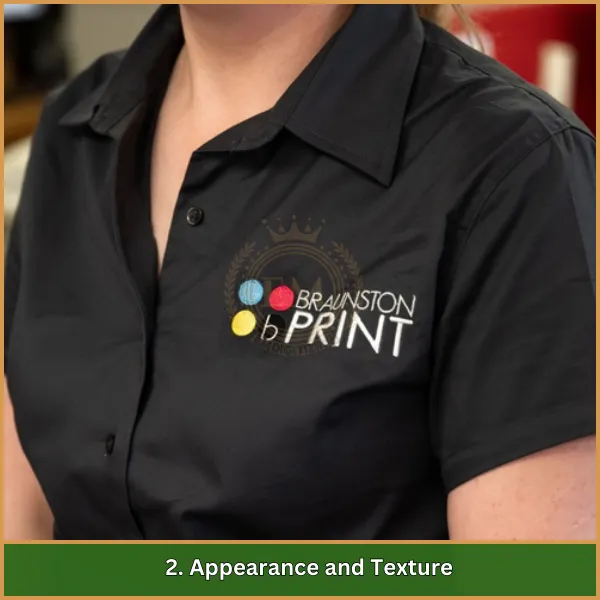
La broderie vs l'impression offre deux options de personnalisation uniques. La broderie fournit une augmentation, look texturé qui ajoute une sensation professionnelle et premium, Le rendre parfait pour les vêtements d'entreprise ou les vêtements haut de gamme. Impression, d'autre part, délivre un lisse, Design plat avec vibrant, Les couleurs accrocheuses mais n'offrent pas la même texture ou la même profondeur que la broderie.
3. Coût et évolutivité
L'impression vs broderie offre différentes considérations de coûts. La broderie est généralement plus chère, Surtout pour les conceptions grandes ou détaillées, En raison du temps et des efforts manuels impliqués. Pour les commandes en vrac, Les coûts peuvent augmenter considérablement. Impression, toutefois, est plus rentable pour la production à haut volume, Comme les coûts de configuration sont répartis sur des quantités plus importantes, En faire une option pour l'impression en vrac.
4. Convient pour différents tissus
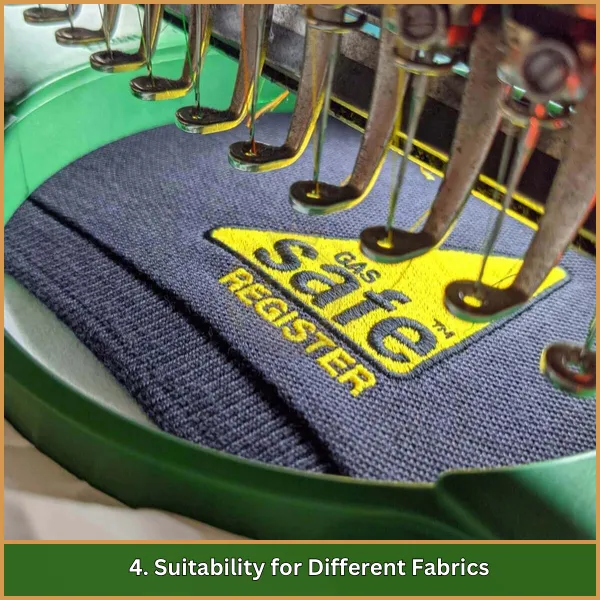
La broderie est polyvalente et fonctionne bien sur plus épais, tissus texturés comme des chapeaux, vestes, et serviettes, Maintenir son intégrité de conception sur les matériaux difficiles. L'impression d'écran fonctionne le mieux sur Smooth, tissus plats tels que le coton et le polyester, Assurer une finition cohérente, Bien qu'il puisse lutter avec des matériaux texturés.
5. Complexité de conception
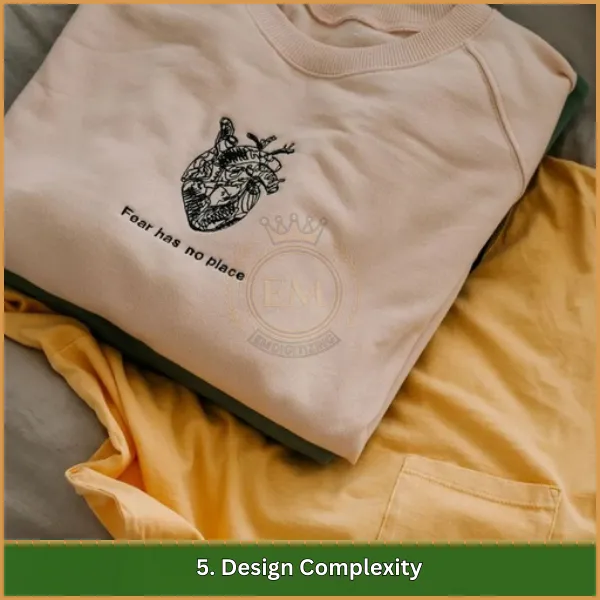
Broderie vs l'impression met en évidence deux méthodes distinctes de personnalisation. La broderie est la meilleure pour simple, Logos audacieux ou texte avec un nombre limité de couleurs dues aux limitations de couture. En revanche, l'impression excelle à la manipulation du complexe, Designs complexes avec plusieurs couleurs, dégradés, et les détails photographiques, offrir une plus grande flexibilité créative.
Meilleurs cas d'utilisation pour la broderie
Lorsque vous comparez l'impression d'écran vs broderie, La broderie se distingue par sa durabilité et son apparence professionnelle, En faire un choix populaire pour des applications spécifiques.
- Vêtements d'entreprise: Parfait pour les uniformes, chemises, et des vestes pour créer un look professionnel et premium.
- Chapeaux et capuchons: La broderie fonctionne mieux sur les matériaux structurés comme les chapeaux, Fournir un design texturé et durable.
- Vêtements d'extérieur: Idéal pour les vestes, sweats à capuche, et d'autres tissus épais qui nécessitent une décoration durable.
- Articles de spécialité: Couramment utilisé sur les serviettes, Sacs, et des couvertures pour une sensation luxueuse et personnalisée.
- Logos et monogrammes: Meilleur pour gras, Designs simples qui améliorent la visibilité de la marque avec une finition haut de gamme.
Meilleurs cas d'utilisation pour l'impression
Dans le débat de la broderie vs impression, l'impression excelle dans la création de vibrants, Conceptions détaillées à moindre coût, Surtout pour les projets à grande échelle ou complexes.
- T-shirts et sweats à capuche: Parfait pour créer des designs colorés et détaillés sur des vêtements décontractés.
- Commandes en vrac: RETENDANT pour les grandes quantités, Le faire idéal pour les événements promotionnels et les cadeaux.
- Conceptions complexes: Meilleur pour les modèles complexes, dégradés, et œuvres d'art multicolores.
- Tissus légers: Fonctionne bien sur des matériaux lisses et minces comme le coton ou le polyester.
- Marchandises personnalisées: Idéal pour créer des conceptions uniques sur des sacs fourre-tout, tasses, et d'autres articles promotionnels.
Conclusion
En ce qui concerne la broderie vs l'impression, Le choix dépend de vos besoins. Pour une prime, look durable, La broderie est idéale. Si tu as après Bold, Designs colorés pour les t-shirts ou les articles en vrac, L'impression est la voie à suivre.
Chez EMDigitizing, Nous nous spécialisons dans la vie de vos créations avec notre numérisation de broderie et services d'art vectoriel. Nos prix sont imbattables, Et nous garantissons la qualité de haut niveau avec des temps de redressement super rapides. Vous voulez voir votre design avant qu'il ne soit finalisé? Pas de problème - nous offrons une option d'aperçu pour chaque commande! Plus, si vous êtes un premier client, Vous apprécierez un incroyable 50% rabais.
Laissez-nous retirer les tracas de vos projets personnalisés. Commencez avec Numérisation EM Aujourd'hui et expérimentez le meilleur de l'entreprise!
FAQ
Si tu veux quelque chose qui dure, La broderie remporte le jeu de durabilité. Il tient contre le lavage et l'usure sans perdre son charme, Contrairement à l'impression, qui peut s'estomper ou se fissurer avec le temps.
Pour économiser de l'argent, L'impression prend les devants. C'est abordable pour de grandes quantités, tandis que la broderie peut devenir coûteuse, Surtout pour les conceptions grandes ou détaillées.
Designs complexes avec beaucoup de couleurs ou de gradients? L'impression est votre go-to. La broderie est super, Mais il est mieux adapté aux conceptions plus simples.
Pas exactement. La broderie brille sur des tissus plus épais comme des vestes et des chapeaux. L'impression fonctionne comme la magie sur des matériaux lisses comme le coton ou le polyester.
Si la vitesse est votre priorité, L'impression est plus rapide, Surtout pour les commandes en vrac. La broderie prend un peu plus de temps en raison des coutures détaillées.
